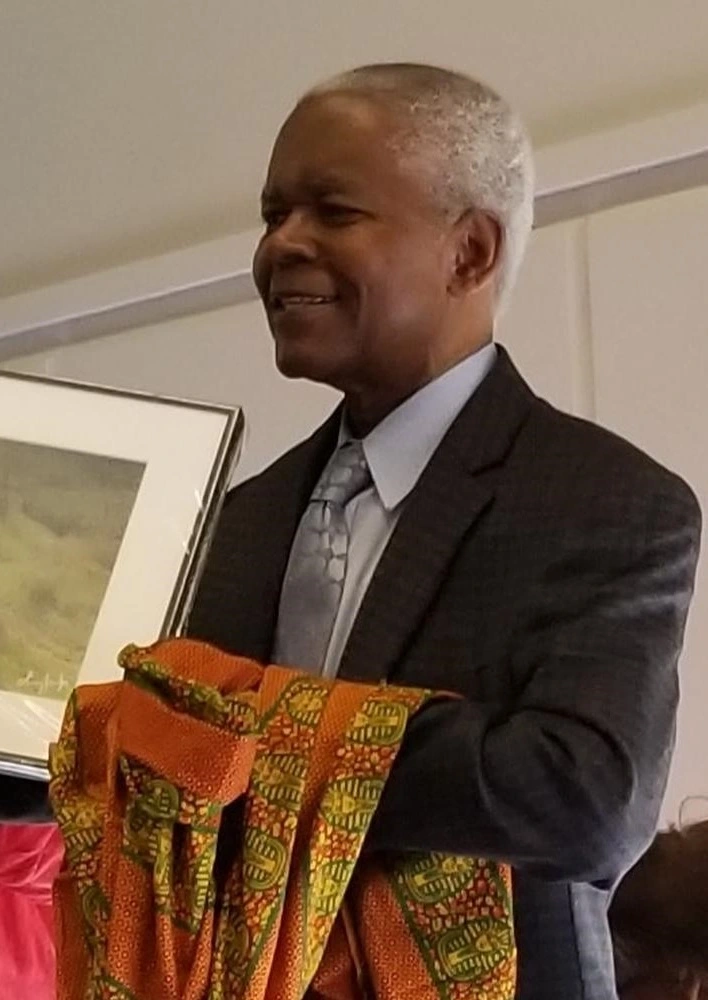
To make a donation for Professor Eyamba Georges Bokamba's Fund, please follow this link.
This fund celebrates the commitment, rigor, tenacity, and visionary leadership of a gifted teacher. People and institutions worldwide have benefited from Professor Eyamba Georges Bokamba's insights and contributions to the fields of Linguistics, African Languages in particular and Less Commonly Taught Languages (LCTL) in general.
Professor Bokamba’s commitment to excellence began with his own scholarship as an international exchange student in high school and college in the United States and as a fellowship recipient throughout much of his graduate studies. He dedicated decades of his adult life to unraveling the mysteries of the human mind as manifested in language structure and usage, as well as the complexities of organizational advancement, especially in service to interdisciplinary thought and scholarship.
This commitment to excellence has inspired generations of students and younger colleagues during his 44 years of teaching and research at UIUC. His ability to expand his students’ horizons beyond linguistics, language teaching, and to provide opportunities has prompted many to embark on their own journeys of scholarship and service to humanity.
Professor Bokamba’s legacy at UIUC, and his achievements in the fields of Linguistics, African Language teaching and acquisition, LCTL and African studies is outstanding. He is a linguist in the truest sense of mastery of multiple languages and analyst of their internal logic. For example, one can witness his language fluency as he shifts with ease from one language to the next, often addressing his students, colleagues, family and friends in their own language, oftentimes with a joke to accompany the greeting.
Furthermore, his multi-disciplinary research in linguistics (i.e., syntax, sociolinguistics, African language acquisition) has contributed to an expanded basis of understanding of the complexity of African languages. The brilliance of speakers of African languages emerges as his students, colleagues, and comrades, all of whom are also committed to expansive possibilities for the people of Africa, endeavor to create the scholarly basis for this understanding.
Professor Bokamba’s contributions in the context of UIUC are impressive. His record of excellence in teaching, scholarship, and administrative leadership in his home department (Linguistics), affiliated departments (French and Italian, and African American and Diaspora Studies) show the breadth and depth of his love for not only the University of Illinois, but also for each and every person he has taught, mentored and collaborated with internationally during his distinguished career.
Professor Bokamba infused leadership development in both professional and academic mentoring of Africanist linguists, language pedagogues and studies administrators. He not only valued the academic excellence and expertise that emerged within his students; he also constantly strove to elevate his students’, mentees’ professionalism and contributions to their shared larger fields. Many students testify to his uncanny ability to inspire them to levels of excellence beyond the classroom as they demonstrated mastery by presenting, teaching, and leading. Professor Bokamba served UIUC with distinction for decades. We hope that his many accomplishments as a teacher, scholar, and leader shall inspire others for generations to come.
For a full list of Professor Bokamba's accomplishments, please see his CV.
Dr. Bokamba details his motivations and objectives for this fund:
It has become abundantly clear that the advent of the global market demands interdisciplinary and inter-institutional scholarly training up to the highest degree possible. Education focusing on African Studies, Linguistics, and Less Commonly Taught Languages is crucial to the advancement of the global citizen. An understanding of peoples of African descent, and the significant contributions and achievements they have made, both historically and contemporaneously, is an essential component of the internationalization of higher education at all levels. However, the financial crisis that state universities have faced in the recent past have forced many of them to adopt an instructional-unit based budgeting approach for allocating financial resources to departments and National Resources Centers (NRC, Title VI). This approach is predicated on enrollments in courses/programs whereby those with low enrollments that do not meet specified minimal requirements (e.g., the 6-12 rule in undergraduate courses at the University of Illinois) are dropped from the list of offerings each semester.
While this fiduciary approach to budget management is justified by the exigencies of the moment, it has unintended and cascading negative consequences on the viability of interdisciplinary and international studies. For example, the dropping of courses over a period of time in an academic unit deprives students of opportunities to pursue their specialization propitiously, and thus delays the completion of their overall program. Such delays in turn subject them to financial support limitations (e.g., three years for an M.A. student in African Studies, and five for a Ph.D. in linguistics). As a result of this last constraint, a significant number of them who are caught in this situation opt to find an assistantship in an external department or seek employment outside of the university, instead of focusing on the completion of their M.A. thesis or dissertation. Clearly this is not an optimal choice for their professional training and competitive entry into their chosen career.
Cognizant of such financial challenges faced by graduate students, and with respect to the potential leadership development opportunities that could be missed due to these limitations, this fellowship aims principally to encourage interdisciplinary, African-centric advanced research, and contributions to the specified fields. Accordingly, it is established to support a selection of outstanding graduate students who will fall under this category.